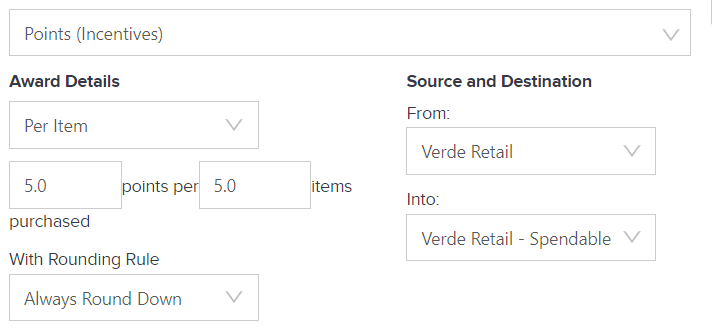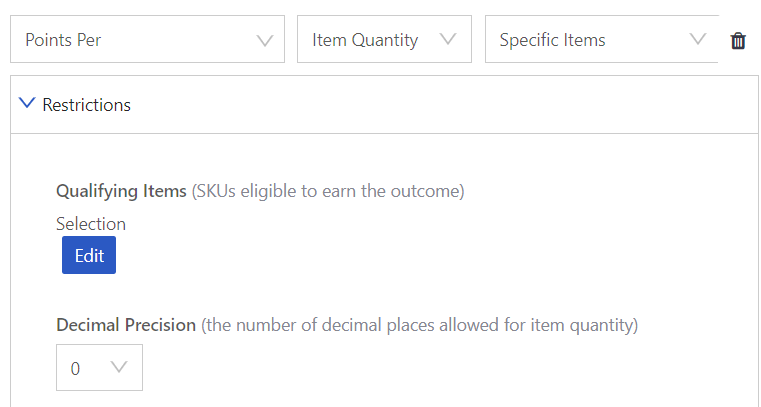Points Per events
In Points Per events, members buy one or more items from the brand’s catalog and earn the outcomes associated with the purchase rule. This is the same behavior as the purchase rules. And like purchase rules, the intent of a points per rule is to motivate members to buy items from the brand’s catalog. But with points per rules, the point awards are dynamic. The number of points earned by members can differ depending on the amount spent or number of items bought.
For example, a points per rule could specify that members earn double points for every dollar spent on gloves in November. Similarly, a points per rule could state that members who purchase three items in a single transaction earn triple points for every dollar spent.
Points Per events are especially well-suited to tiered loyalty programs, motivating members to climb tiers by offering greater points multipliers at higher tier levels. Take, for example, a loyalty program with three tiers: Bronze, Silver and Gold. Members of the Bronze tier earn 1 point per dollar spent, while Silver members earn 2 points per dollar spent, and Gold members earn 3 points per dollars spent.
Supported points per purchase events
The SessionM platform supports the following points per purchase events:
| Event | Description |
|---|---|
| Points Per: Amount Spent: Any Item |
Purchase any items from the brand’s catalog and, if the amount spent meets the specified threshold, receive a dynamic points award based on the amount spent. |
| Purchase specific items from the brand’s catalog and, if the amount spent meets the specified threshold, receive a dynamic points award based on the amount spent. | |
| Purchase any items from the brand’s catalog and, if the number of items purchased meets the specified threshold, receive a dynamic points award based on the number of items purchased. | |
| Purchase specific items from the brand’s catalog and, if the number of items purchased meets the specified threshold, receive a dynamic points award based on the number of designated items purchased. |
How dynamic point awards are determined
In points per purchase events, members are awarded a dynamic number of points when they purchase items eligible for the point award. Three factors determine the number of points awarded to the member:
-
Whether the points are awarded for the purchase of specific items, or for the purchase of any item in the vendor’s catalog.
-
Whether the points award is determined by the amount spent, or by the number of items purchased.
-
Whether a multiplying factor is applied to the point award – for example, double or triple points. IMPORTANT: The points multiplier is specified in the outcome, not in the rule. See Outcomes for more information.
Consider the following behavior:
If member purchases a Kingfisher surf ski, award 3 points for every dollar spent.
The behavior has two components:
-
The rule that determines whether a purchase qualifies for the points reward specified in the outcome. In this example, the rule specifies that the point reward is contingent on the purchase of a specific item in the catalog – in this case, a Kingfisher surf ski.
-
The outcome that determines the number of points awarded. The outcome indicates the point award for purchasing the surf ski – in this case, 3 points for every dollar spent.
Full- and partial-points awards
With dynamic point rewards, you can choose to award either full-point awards (for example, 10) or partial-point awards (for example, 7.4). The selected rounding option determines whether the point award is a full-point award (whole number) or partial-point award (fraction).
The SessionM rules engine uses the following formula to determine the initial value for a points award:
-
Amount Spent: dollar amount spent / points per dollar spent
-
Item Quantity: number of items purchased / number of items required to earn 1 point
Full-point awards
Full-point award calculations are straightforward. The rules engine use the above formula to obtain the initial result, and then applies the rounding formula to determine the final full-point point award.
For example, a Points Per: Amount Quantity rule states that members earn 1 point for the purchase of 3 items. The rules engine first divides the quantity (4) by the required amount (3) to obtain an initial value of 1.33. It then applies the rounding rule to obtain the final point amount. For example, an initial value of 1.33 with the Round Up 5 rule returns 1 point as the reward.
Rounding rules for full-point awards
The following rounding rules return full-point awards.
-
Round Up (whole number): The rules engine rounds the integer up to the next higher whole number. For example, 10.77 rounds up to 11.
-
Round Up 5: If the decimal value is equal to or greater than 5, the rules engine rounds the integer up to the next higher whole number. For example, 10.77 is rounded up to 11. If the decimal value is less than 5, the rules engine rounds the integer down to the next whole number. For example, 10.44 rounds down to 10.
-
Always Round Down: The rule engine always rounds the integer down to the next lower whole number. For example, 1.4 rounds down to 1.0.
Partial-point awards
Partial-point awards use an additional factor known as decimal precision to determine the final value of the point reward. Decimal precision determines the number of decimal places (also known as significant digits) used by the SessionM rules engine to calculate partial-point awards:
-
For Points Per: Amount Spent rules, the Rewards System Outcome_Rounding_Precision setting determines the number of decimal places used in point calculations. The default for campaigns is 3 decimal places. Consult your SessionM Customer Success representative for more information on the setting for your loyalty program.
For example, an amount spent rule specifies that members earn 1 point for every 3 items purchased. A member buys 4 items. The rules engine divides 4 (number of items purchased) by 3 (number of items required to earn 1 point). The initial result is 1.333. Next, the rule engine applies the decimal precision setting to the initial result to obtain an intermediate amount. Assuming a decimal precision of 2, the initial result of 1.333 is truncated to two decimal places and becomes 1.33. The selected rounding rule is then applied to this intermediate value to obtain the final value. If the Round Up (configured decimal) rule is used, the final value of the partial-point award is 1.34.
-
For Points Per: Item Quantity rules, the value specified for the Decimal Precision restriction determines the number of decimal places used in partial-point award calculations. See Decimal Precision for more information. The rules engine follows the same sequence described above to obtain the final result.
Rounding rules
The following rounding rules return partial-point awards.
Note about decimal precision. In the examples below, assume that the point rounding precision setting has been set to 2.
-
Round Up (configured decimal): The rules engine rounds the integer up to the next higher decimal. For example, 10.77 rounds up to 10.78. If necessary, the value is truncated to the number of decimal places specified by the decimal precision setting used by your loyalty program. For example, if the precision is set to 1 decimal place, then the value 10.77 is truncated to 10.8.
-
None: Fractions are left in their original value. For example, 123.45 remains 123.45. If necessary, the value is truncated to the number of decimal places specified by the rounding precision used by your loyalty program. For example, if precision is set to 1 decimal place, then 10.77 is truncated to 10.7.
"Graded" dynamic points awards
In certain circumstances, a loyalty program may decide that it wants to award points in defined increments. Take a gas retailer for example. To encourage its members to purchase more items in each transaction, it awards 5 points for each 5 gallons of gas that a member purchases. That is, purchase 5 gallons earn 5 points. Purchase 10 gallons, earn 10 points.
In this scenario, however, points are only awarded when a member reaches a defined threshold or increment (in this example, each 5 gallons of gas). If a member purchases 6, 7, 8 or 9 gallons, they still are awarded 5 points. It's not until they buy 10 gallons that the point award jumps to 10.
It's like the grading system used in schools. Grades between 80 and 89 are scored as a B, which earns 3.0 points. So a grade of 82 earns a B (3.0 points). Likewise, a grade of 88 also earns a B. It is not until the grade reaches 90 that a student earns 4.0 points. Again, the intent here is to motivate members to reach the higher thresholds and earn more points.
How to configure a "graded" points scenario
To configure a graded points scenario, you must:
-
For Points Per: Amount Spent rules:
-
Set the Outcome_Rounding_Precision reward system setting to 0. Contact your SessionM Customer Success representative to set this value.
- Select the Always Round Down option for the outcome associated with the Points Per rule.

-
-
For Points Per: Item Quantity rules:
-
Set the Decimal Precision restriction for the points event to 0. See Decimal Precision for more information.

- Select the Always Round Down option for the outcome associated with the Points Per rule.

-
How discounts affect dynamic point awards
Factors that determine how the SessionM rules engine determines discounts in points per rules include:
-
Discount Eligibility restriction
Indicates whether fully discounted items (items that have a zero-dollar value) are included in determining the outcome earned by members. This restriction is disabled by default.
SeeDiscount Eligibility for more information.
-
discounted_line_ids and discounted_line_id_quantities attributes in the transaction payload
-
If discount_line_ids is specified, the SessionM rules engine applies the discount to those items alone.
-
If discount_line_ids is not specified, the discount is calculated for each item in the transaction.
Related strategies
See the following strategies for examples of how points per events are used in the SessionM platform: